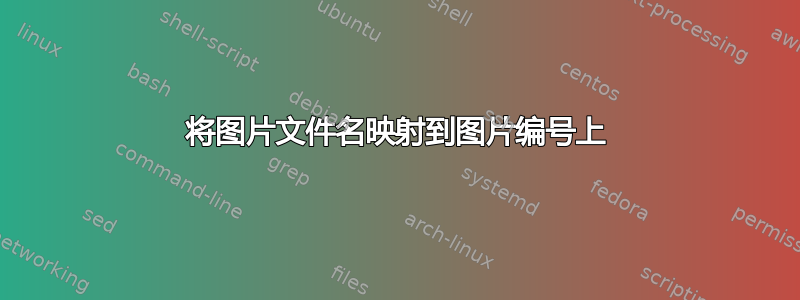
我正在寻找一种方法来在图形文件名和其图形编号之间建立映射。您可以在下面找到 MWE,其中指定了所需的输出。
\documentclass{article}
\usepackage{graphicx}
\usepackage{caption}
\usepackage{subcaption}
\usepackage{duckuments}
\begin{document}
%%%%%%%%%%%%%%%%%%%%%%%%%%%%%%%%%%%%%%%%%%%%%%%%%%%%%%%%%%%%%%%%%%%%%
% Some code that provides the same output as the following fragment:
%%%%%%%%%%%%%%%%%%%%%%%%%%%%%%%%%%%%%%%%%%%%%%%%%%%%%%%%%%%%%%%%%%%%%
Figure map:
\begin{itemize}
\item Figure 1: example-image-a
\item Figure 2: example-image-b
\item Figure 3: example-image-c
\end{itemize}
%%%%%%%%%%%%%%%%%%%%%%%%%%%%%%%%%%%%%%%%%%%%%%%%%%%%%%%%%%%%%%%%%%%%%
\begin{figure}
\centering
\includegraphics{example-image-a}
\label{fig:alef}
\caption[Alef figure.]{Alef.}
\end{figure}
\begin{figure}
\centering
\includegraphics{example-image-b}
\label{fig:bet}
\caption[Bet figure.]{Bet.}
\end{figure}
\begin{figure}
\centering
\includegraphics{example-image-c}
\label{fig:gimel}
\caption[Gimel figure.]{Gimel.}
\end{figure}
\end{document}
次优解决方案发布于获取单个图形文件的标题编号,但有时我需要使用, []\listoffigures参数来生成真正的目录\caption。
我想过创建一个副本\listoffigures,但这似乎不可行(修改命令以获取替代图表列表)。
答案1
在另一个主题中(如何对按图号索引的列表进行排序?)您要求采用更自动化的方式来完成此任务。
既然你说这是一份要发送给出版商的清单,我认为目标不是将文本包含在实际文档中。因此,我认为最好将这些数据注销到辅助文件中。
添加你的序言
\usepackage{etoolbox}
% BEGIN Source:
% https://tex.stackexchange.com/questions/597506/map-the-figure-filenames-onto-the-figure-numbers/597710?noredirect=1#comment1499574_597710
% BEGIN Optional
\usepackage{xstring}
\def\formatfigpathline#1#2{%
\bgroup
\def\frontpart{Figure #1:}%
\StrLen{\frontpart}[\frontpartlength]%
\ifnum\numexpr\frontpartlength\relax<11\relax
\edef\frontpart{\frontpart\space\space\space\space}%
\StrLeft{\frontpart}{11}[\frontpart]%
\fi
\xdef\figpathline{\frontpart\space #2}
\egroup
}
% END
\makeatletter
\newcounter{fignumlength}
\ifx\formatfigpathline\@undefined
\def\formatfigpathline#1#2{%
\def\figpathline{Figure #1: #2}%
}
\fi
\newwrite\figpathfile
\immediate\openout\figpathfile=\jobname_figures.txt\relax
\immediate\write\figpathfile{Version: \today}%
\def\figpath@stagedfigs{}
\def\figpath@stagefig#1{%
\expandafter\gdef\expandafter\figpath@stagedfigs\expandafter{%
\figpath@stagedfigs\do{#1}%
}%
}
\newbool{FigpathIsEnabled}
\newbool{FigpathEnableOnIncludegraphics}
\setbool{FigpathEnableOnIncludegraphics}{true}
\newcommand\figpathEnable{%
\unless\ifx\label\@figpathLabel
\global\let\orig@label\label
\let\label\@figpathLabel
\fi
\unless\ifFigpathIsEnabled
\global\booltrue{FigpathIsEnabled}%
\fi
}
\newcommand\figpathDiscard{%
\gdef\figpath@stagedfigs{}%
}
\newcommand\figpathDisable{%
\ifx\label\@figpathLabel
\let\label\orig@label
\fi
\ifFigpathIsEnabled
\figpathDiscard
\global\boolfalse{FigpathIsEnabled}%
\fi
}
\newbool{@figpath@isfigure}
\newcommand\figpathFlush{%
\boolfalse{@figpath@isfigure}
\def\@cntr@name@figure{figure}%
\def\@cntr@name@subfigure{subfigure}%
\ifx\@currentcounter\@cntr@name@figure
\@figpath@isfiguretrue
\fi
\ifx\@currentcounter\@cntr@name@subfigure
\@figpath@isfiguretrue
\fi
\if@figpath@isfigure
\bgroup\def\do##1{%
\formatfigpathline{\@currentlabel}{##1}%
\immediate\write\figpathfile{\figpathline}%
}%
\figpath@stagedfigs\gdef\figpath@stagedfigs{}%
\egroup
\else
\PackageWarning{figpath}{Not flushing figure paths: wrong counter (\@currentcounter)!}%
\fi
}
\AtBeginDocument{
\newcommand\@figpathIncludegraphics[2][]{%
\ifFigpathEnableOnIncludegraphics
\unless\ifFigpathIsEnabled
\figpathEnable
\aftergroup\figpathDisable
\fi
\fi
\ifFigpathIsEnabled
\figpath@stagefig{#2}%
\fi
%
\orig@includegraphics[#1]{#2}%
}
\global\let\orig@includegraphics\includegraphics
\global\let\includegraphics\@figpathIncludegraphics
\let\orig@label\label
\let\label\@figpathLabel
}
\def\@figpathLabel{%
\ifFigpathIsEnabled
\figpathFlush
\fi
\orig@label
}
\makeatother
\AtEndEnvironment{figure}{
\figpathFlush
}
\AtEndEnvironment{subfigure}{
\figpathFlush
}
\AtBeginEnvironment{figure}{
\figpathDiscard
\figpathEnable
}
\AtEndEnvironment{figure}{
\figpathDisable
}
% END
并像平常一样使用您的图形和子图形。
这将创建一个包含
Figure 1: example-image-a
Figure 2a: example-image-b
Figure 2b: example-image-c
如果您的文档名为document.tex,则该文件名为document_figures.txt,即_figures.txt附加在其后面。
这就是你想要的吗?
答案2
这是一个可能的方法。请注意,\label应该后標題。
\documentclass{article}
\usepackage{graphicx}
\makeatletter
\newcommand{\RFincludegraphics}[2][]{% RF for `remember file'
\def\@currentimage{#2}%
\includegraphics[#1]{#2}%
}
\newcommand{\RFlabel}[1]{%
\label{#1}\let\@currentlabel\@currentimage\label{RF@#1}%
}
\newcommand{\fileref}[1]{%
\ref{#1}: \texttt{\ref{RF@#1}}%
}
\makeatother
\begin{document}
%%%%%%%%%%%%%%%%%%%%%%%%%%%%%%%%%%%%%%%%%%%%%%%%%%%%%%%%%%%%%%%%%%%%%
% Some code that provides the same output as the following fragment:
%%%%%%%%%%%%%%%%%%%%%%%%%%%%%%%%%%%%%%%%%%%%%%%%%%%%%%%%%%%%%%%%%%%%%
Figure map:
\begin{itemize}
\item Figure \fileref{fig:alef}
\item Figure \fileref{fig:bet}
\item Figure \fileref{fig:gimel}
\end{itemize}
%%%%%%%%%%%%%%%%%%%%%%%%%%%%%%%%%%%%%%%%%%%%%%%%%%%%%%%%%%%%%%%%%%%%%
\begin{figure}[htp]
\centering
\RFincludegraphics{example-image-a}
\caption[Alef figure.]{Alef.}
\RFlabel{fig:alef}
\end{figure}
\begin{figure}[htp]
\centering
\RFincludegraphics{example-image-b}
\caption[Bet figure.]{Bet.}
\RFlabel{fig:bet}
\end{figure}
\begin{figure}[htp]
\centering
\RFincludegraphics{example-image-c}
\caption[Gimel figure.]{Gimel.}
\RFlabel{fig:gimel}
\end{figure}
\end{document}



